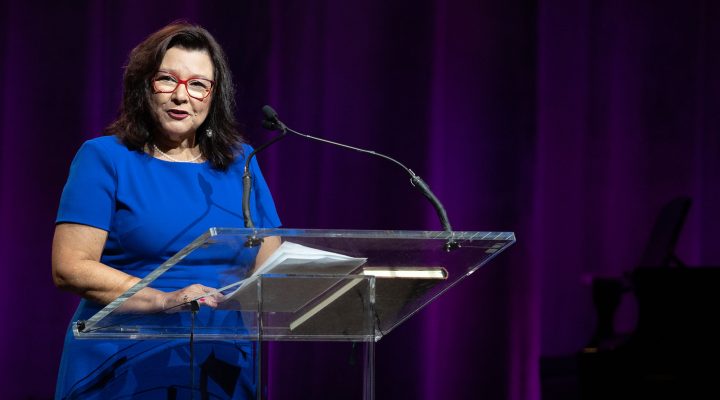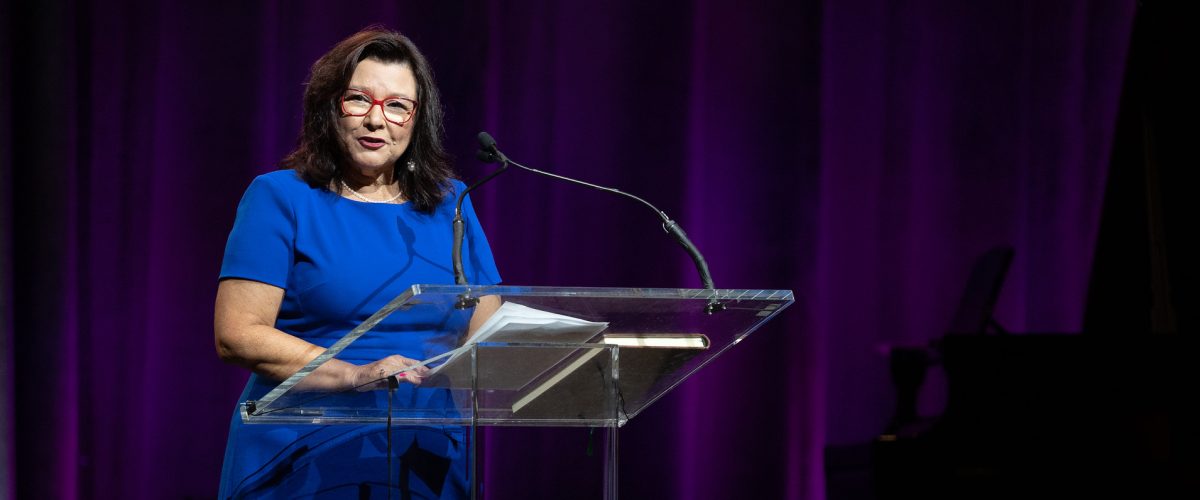As the Cooperative Baptist Fellowship’s new moderator, Debbie McDaniel said she wants women and girls to know they have a place in Baptist life, whether as ordained or lay leaders.
“I want girls to know you and I are both fearfully and wonderfully made and that God can use either one of us. Young women and girls definitely need to hear that they are created imago Dei, and that God has a plan and a purpose for their lives,” she said in a recent interview with Baptist News Global.
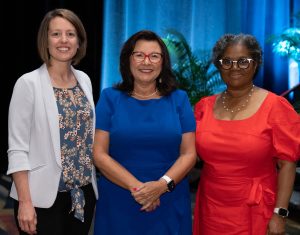
Carol McEntyre, Debbie McDaniel, Patricia Wilson
McDaniel became CBF moderator on June 30, succeeding Baylor University law professor and associate dean Patricia Wilson, who in turn succeeded Carol McEntyre, senior minister at First Baptist Church in Columbia, Mo.
That three women in succession would serve as the top elected leader of a national Baptist body would have been unthinkable a generation ago.
McDaniel, a full-time substitute teacher who grew up Southern Baptist in a small Texas town, didn’t hear about lay and women’s ministry until adulthood, making her election as CBF’s highest-ranking officer somewhat astonishing, she said. “I could not have imagined growing up that this is something that could have ever happened to me. I didn’t even know about denominational life or that women could have a place in it. I didn’t know I could do more than give out cookies at VBS.”
“I didn’t know I could do more than give out cookies at VBS.”
With no disrespect for cookies or VBS, McDaniel has been doing much more than that since transitioning into CBF life around 2001. Her service began on the coordinating councils of Oklahoma CBF and Alabama CBF followed by five years on the CBF Ministry Council, including serving as its chair from 2020 to 2021. She also served on the Fellowship’s A New Covenant Commission.
She also has been active in her home congregations, including serving on the leadership team of a CBF church plant in Oklahoma before moving to Alabama, where she has chaired the missions committee and served as a deacon and member of the vision team at First Baptist Church in Huntsville.
She recalled getting a taste of lay leadership while still in Texas. At First Baptist Church in Arlington, McDaniel participated in mission trips, taught VBS and Sunday school and engaged in finance committee work. But when the church asked if she would consider ordination as a deacon if invited to do so, she said no.
“It caused me to think hard, but it was not the time for me to put my hat in the ring for that,” she explained. “Then we moved to Tulsa and to a church that did not” have women deacons.
Nor had she really been prepared for the question and how hesitant it made her feel. “It had never been modeled to me growing up. It wasn’t an expectation. It hadn’t been anything I ever thought about.”
But the experience left a lasting impression and assumed an urgency in Oklahoma when McDaniel, already the mother of two young sons, was expecting a baby girl.
“It was then that I really started recognizing that the people I was surrounding my family with did not recognize the gifts and callings of women,” she said. “I realized I did not want to expose (my daughter) to that. And I realized that I am doing this to my boys, too. My boys aren’t seeing the women in leadership roles they need to see.”
“I really started recognizing that the people I was surrounding my family with did not recognize the gifts and callings of women.”
Eventually she and her husband, Michael, helped form a new congregation with guidance from Oklahoma CBF. McDaniel said her eyes were opened by the encounter. “I just ate it all up and said these are my people. These are people I could relate to.”
Another pivotal moment came during a Baptist women’s conference where Molly Marshall was preaching.
“It was the first time I heard a woman preach. I thought, oh my gosh, this is amazing,” she said of Marshall, then president at Central Baptist Theological Seminary. “Being able to see a woman in the pulpit preaching just as well if not better than any preacher I had ever heard — it was just amazing.”
Just as incredible were the opportunities open to laity in CBF, she said. “That men and women could serve equally — I was amazed. Even though I never felt a calling to ordained ministry, I was still called and CBF had room for that. I never could have imagined growing up that I would be able to be in any kind of organization where I could use my gifts as ministry.”
The ascendance, potential and importance of lay leadership embodied in McDaniel’s journey are often overlooked in Baptist life, said Marshall, now president of United Theological Seminary of the Twin Cities, a United Church of Christ school in Minnesota.
“Her story is the larger story of women’s leadership in moderate Baptist life. Women were becoming deacons prior to many of us being ordained,” Marshall said. “Women as deacons in moderate churches have paved the way and often been the voices in the congregations who would nudge leadership to consider women for staff positions or as senior ministers.”
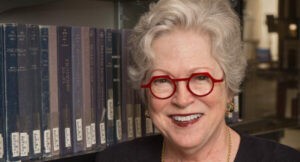
Molly Marshall
Marshall traced the trend to Helen Moore-Montgomery, the pioneering female deacon at First Baptist Church in Oklahoma City who helped organize lay gatherings when CBF was in its infancy. “She was one of the early lay leaders in the first few years of CBF,” Marshall recounted.
Now, McDaniel is well equipped to continue that tradition, Marshall said. “Her calling and leadership are no less evidence of a calling than were she a staff member in ordained ministry. As a lay person, she has tremendous influence. She has a voice. She has commitment and she has displayed that over the years.”
The timing and manner in which McDaniel felt and answered her calling into lay ministry will empower her as moderator, former CBF Executive Coordinator Suzii Paynter March said.
“Her understanding of herself as a leader has been a really important part of the strength that she’s had in the life of her congregation and in CBF life and in CBF Alabama and CBF Oklahoma,” March said. “Her winsome personality, her sense of humor, her honesty — those traits that she communicates and gives freely — really are a very important part of her leadership and this idea of lay women arising in the fulness of time.”
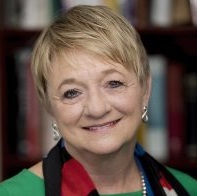
Suzii Paynter March
March said she has seen McDaniel working in leadership roles at First Baptist Church in Huntsville. That fellowship also knows what she is capable of doing. “Not only does she understand she can do more than hand out cookies at VBS, but her congregation knows she can do more than hand out cookies at VBS.”
McDaniel said her main tasks will be to work with Executive Coordinator Paul Baxley in encouraging ongoing CBF projects such as the Pan African Koinonia, the Latino Network, and Brian Foreman’s work as the newly appointed coordinator of congregational ministry. These and other ministries illuminate and celebrate the gifts of laypersons across the Fellowship.
“There are more opportunities for larger numbers of us to serve in leadership, and not just in supporting roles,” she said. “These are men and women who have ministries in their own right, and they are bringing their diversity to the Fellowship so we can be better Christians to our neighbors.”
Related articles:
Carol McEntyre to become CBF Moderator-Elect at Birmingham General Assembly
Do not lose heart while tending the soil of God’s work, speakers urge CBF assembly

